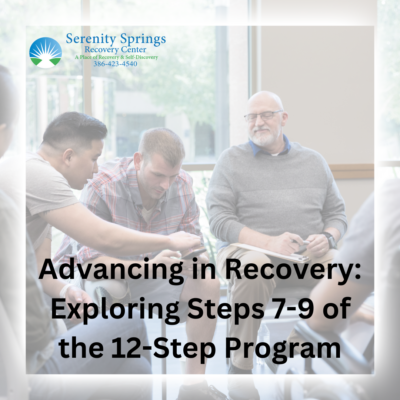Advancing in Recovery: Exploring Steps 7-9 of the 12-Step Program

As individuals progress through their journey of recovery, Steps 7-9 of the 12-step program represent pivotal stages in their growth and transformation. These steps involve deep introspection, making amends for past wrongs, and committing to ongoing personal growth.
Step 7: Humbly asked Him to remove our shortcomings.
Process
Step 7 involves a profound act of humility and self-reflection, as individuals acknowledge their shortcomings and ask their Higher Power for help in overcoming them.
- Self-Reflection: Individuals examine their character defects and shortcomings honestly and without judgment.
- Humility: They humbly acknowledge their imperfections and recognize the need for assistance in addressing them.
- Prayer or Meditation: Individuals actively seek guidance and support from their Higher Power through prayer, meditation, or other spiritual practices.
Benefits
- Personal Growth: Step 7 fosters personal growth and self-awareness by encouraging individuals to confront and address their shortcomings.
- Spiritual Connection: It deepens individuals’ spiritual connection by fostering a sense of humility and reliance on their Higher Power.
- Emotional Healing: Asking for help in addressing shortcomings can lead to emotional healing and a sense of inner peace.
Challenges
- Ego: Overcoming pride and ego can be challenging, as individuals may resist acknowledging their flaws.
- Vulnerability: Asking for help and admitting weaknesses requires vulnerability, which can be uncomfortable for some.
- Patience: Progress in overcoming shortcomings may be gradual, requiring patience and perseverance.
Step 8: Made a list of all persons we had harmed, and became willing to make amends to them all.
Process
Step 8 involves taking inventory of past actions and relationships and making a list of individuals harmed as a result of addiction or other behaviors. It also requires a willingness to make amends and seek forgiveness.
- Inventory: Individuals reflect on their past behaviors and identify people they have harmed directly or indirectly.
- Willingness: They cultivate a genuine willingness to make amends and repair damaged relationships.
- Preparation: Individuals may seek guidance from a sponsor or support group on how to approach making amends in a respectful and constructive manner.
Benefits
- Restoration of Relationships: Step 8 paves the way for healing and reconciliation in relationships strained by past actions.
- Personal Integrity: Making amends aligns with principles of honesty and integrity, fostering a sense of personal responsibility.
- Emotional Healing: Seeking forgiveness and offering apologies can lead to emotional healing and closure for both parties involved.
Challenges
- Fear of Rejection: Individuals may fear rejection or resentment from those they harmed, making it difficult to approach them.
- Overwhelm: The process of making amends can feel overwhelming, especially if there are many people on the list.
- Self-Forgiveness: Some individuals struggle with forgiving themselves for past mistakes, which can hinder the amends process.
Step 9: Made direct amends to such people wherever possible, except when to do so would injure them or others.
Process
Step 9 involves taking concrete action to make amends to those harmed, wherever possible and appropriate. It requires courage, humility, and a genuine desire to repair relationships.
- Courage: Individuals summon the courage to approach those they have harmed and take responsibility for their actions.
- Humility: They humbly apologize and seek to make things right, without making excuses or expecting forgiveness.
- Restitution: Individuals may offer restitution or reparations where appropriate, as a tangible expression of their remorse and commitment to change.
Benefits
- Closure: Making direct amends provides closure and resolution, allowing individuals to move forward with a clean conscience.
- Reconciliation: It fosters reconciliation and healing in damaged relationships, rebuilding trust and connection.
- Personal Growth: Step 9 promotes personal growth and maturity by encouraging accountability and taking responsibility for one’s actions.
Challenges
- Fear of Confrontation: The prospect of facing those they have harmed can be daunting, triggering anxiety and fear.
- Disappointment: Individuals may encounter resistance or rejection from some individuals, which can be discouraging.
- Discernment: Knowing when and how to make amends without causing further harm requires discernment and sensitivity.
Embracing the Impact: Steps 7-9 and Their Transformative Influence on the Journey of Recovery
Steps 7-9 of the 12-step program mark significant milestones in the journey of recovery. These steps involve humility, self-reflection, and a commitment to personal growth and healing. While they present challenges such as overcoming pride, facing fears, and navigating difficult conversations, they also offer profound benefits, including emotional healing, restoration of relationships, and personal transformation. Embracing Steps 7-9 requires courage, resilience, and a willingness to confront the past and embrace a brighter future.




